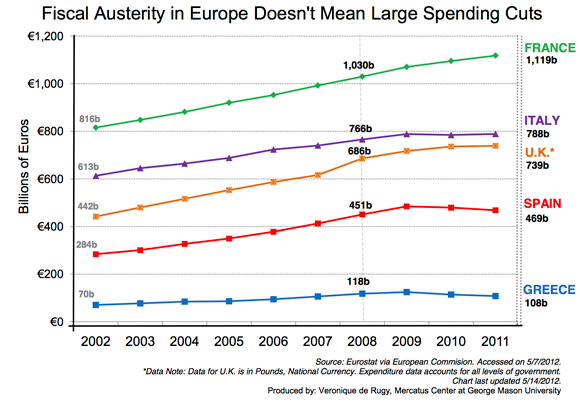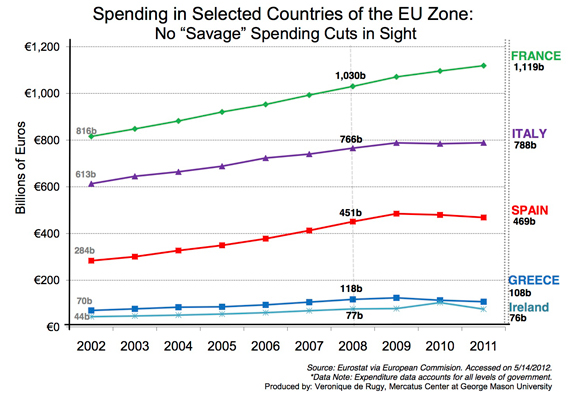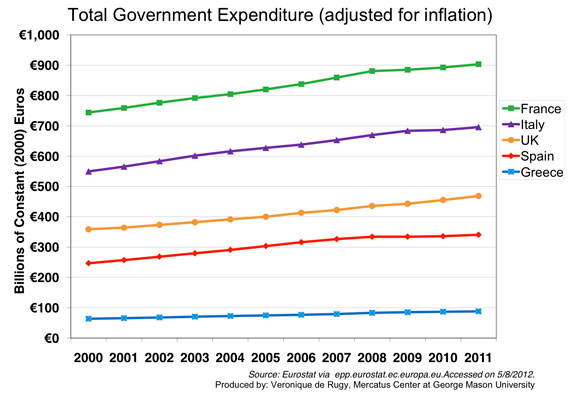Music to read by:
'Cause nothin' lasts forever
And we both know hearts can change
And it's hard to hold a candle
In the cold November rain
We've been through this such a long long time
Just tryin' to kill the pain
And we both know hearts can change
And it's hard to hold a candle
In the cold November rain
We've been through this such a long long time
Just tryin' to kill the pain

By Walter Russell Mead
“Crisis in the eurozone” stories are getting boring and this is one
two year old soap opera the world would just as soon see disappear.
Nevertheless it grinds on; yesterday the German finance minister said it
could go on for another two years. Unfortunately, he’s right.
But while the news from Europe
is complicated and inconclusive (they are always threatening to jump
off the bridge but so far, no one has), this is still a story one has to
watch. And after months and years when the crisis was mostly in the
hands of elites — heads of government, central bankers and the like — in
the last couple of weeks the public has been getting involved, and that
makes the crisis more dangerous and harder to solve.
The Greek and French elections were the public’s first real chance to
get a word in on how Europe is handling the crisis, and the word from
the public is one of those expletives that we don’t allow at Via Meadia.
The public not only doesn’t approve of the way Europe is handling its
problems; it wants to hang, draw and quarter the people responsible. The
Greeks and the French both voted for candidates who wanted to rip up
the fragile agreements already negotiated; as more European countries
hold elections we must expect that more European politicians will come
to power with mandates to change Europe’s direction. Many like the new
French President François Hollande will try to manage this artfully, but
the Greeks are unlikely to be the only bull in Europe’s china shop by
the time this is done.


The other way that public sentiment threatens to blow Europe sky high is swifter, less predictable and far more dramatic. As Greek savers and investors read the writing on the wall, they are pulling their money out of Greek banks. They know that if Greece pulls out of the euro, the government will do something funny to the banks; they aren’t sure what (nobody really is), but there is a strong suspicion that any money left in Greek bank vaults will be converted from euros to drachmas at the stroke of a pen (more likely, by the tap of a keyboard), and those drachmas will soon be worth much, much less than a euro.
Better to have your money in Swiss or German bank than in a Greek
one, every sentient vertebrate in Greece has to understand; as a result,
hundreds of billions of euros have been moving out of the Greek banking
system. At one point last week, television networks were sending camera
crews out onto the streets to look for panicky customers standing in
line at ATMs or at bank counters; but then they realized that these days
you can do it all on the net. We have entered the age of the invisible
bank run and are waiting for the first virtual panic.
An invisible bank run is a hard thing to watch; not only is it less
telegenic than the old-fashioned kind, one relies on numbers from
official government agencies for statistics. How much money left the
banking system today? How many banks need emergency liquidity to meet
the tide of withdrawals? In the old days, reporters could and did watch
lines form outside the banks and watch the armored trucks arrive with
cash. These days it is happening anonymously and you only know what they
tell you.


They are very unlikely to tell you the truth. Officials lie like rats
in times of financial panic; they do it out of a sense of duty. They
will insist that a given country will never leave the euro until the
moment that it does; they will say that a deposit freeze is unthinkable
until they announce that they’ve done it; they will tell you a bank is
rock solid until the moment they padlock its doors. This is all for your
own good, of course. They don’t want you to panic — and they want to
make sure that your money is trapped when they take it away or turn it
from gold into straw.
Bank runs, even virtual ones, are the method by which public fear can
blow up the eurozone. A bank run, as hundreds of thousands of
depositors decide to pull their money out of a bank or a banking system
at the same time, is the financial equivalent of a dam break. Banks,
even very well run ones, never have all the money that their customers
have deposited in their vaults. They lend that money out to other
people, and because they charge borrowers a higher rate on their loans
than they pay savers on their deposits, they make money.
At least they make money as long as enough of the borrowers can pay back their loans.
When borrowers can’t repay their loans, the bank sooner or later has
to “write down” the value of those loans. In bad economic times, when
borrowers are going bankrupt and the collateral on their loans loses
value, banks can make huge losses. This is how Ireland lost its shirt;
the banking system collapsed as the Irish real estate bubble burst,
making building contractors and home owners bankrupt all over Ireland,
and making the real estate that served as collateral for their loans
almost worthless at the same time. The government — to prevent a panic
and bank runs — guaranteed the deposits held by Irish banks, and ended
up assuming such a massive debt that the Republic of Ireland needed a
bailout from Europe.


Since then, European bailouts have been the safety net for all the
countries in the eurozone. When investors worry that countries like
Spain, Portugal and Italy will have a Greek style financial meltdown and
the interest rates on their bonds rise to reflect that risk, the ECB
steps in to buy their bonds and the panic goes away — for a while. More,
when individual banks are having trouble, the ECB has made huge amounts
of money at extremely low interest rates available to them. Spanish
banks, for example, can borrow cheap money from the ECB in order to buy
Spanish government bonds at high interest rates. They pay one percent
interest to the ECB and collect four percent interest from the Spanish
government, and use the profit of three percent to offset their losses
on their loans to private companies and consumers who are going belly up
in Spain’s savage recession.
The success of this little merry-go-round is why Europe calmed down
last December. The ECB in effect prints money which it gives to busted
banks. The busted banks lend the money to insolvent governments at
artificially low rates (but at rates that still allow the banks to make a
profit). It was a neat little trick that kept the crisis quiet without
forcing the Germans to admit openly that the ECB was in effect using
German resources to bail out the rest of the zone.
Bank runs, even virtual bank runs, would blow this fragile
arrangements to bits. As the prospect of Greece leaving the euro becomes
more likely, savers in Portugal, Spain and Italy have to start
wondering if their countries, too, will have to jump ship. Sophisticated
investors have been moving their money out of those countries for some
time; things may soon reach a pass in which ordinary, unsophisticated
investors start to do the same thing. Again, why have your money in some
gut-shot Spanish bank when you can transfer it to a German, Austrian or
Dutch bank with a mouse click? And if you are worried about the whole
eurozone, or that devious financial trolls will find a way to convert
all deposits held by Spanish citizens in European banks to pesos when
and if the change comes, put the money in Switzerland, the UK or even
the US.

If a few thousands or a few tens of thousands do this in Portugal,
Italy and Spain, no problem. But if hundreds of thousands or millions of
people shift their money out of their home banking systems, then you
have a new and very grave bank crisis that blows the December fix out of
the water. Either the ECB would start creating trillions of euros to
bail out the Club Med banks (and Club Med under some circumstances could
stretch as far north as France), or banking systems start exploding
like firecrackers across the southern tier. At the same time you would
have a new panic on the bond markets; nobody is going to want to own
Spanish or Italian debt under those circumstances.
This is one of those cases when what is good for one is bad for all. A
good financial investor would probably be suggesting to anybody in
Spain or even Italy that it is a good idea to separate the fate of your
savings from the fate of your country’s currency or its banking system.
The trivial costs of moving money into a safer banking system are well
worth the protection you gain.
But if everyone gets and acts on this sound and prudent advice, the
whole banking system and perhaps the whole eurozone comes down.
Europe’s stability now rests on the sloth and stupidity of European
savers. As long as millions of retail investors think their money is OK,
it will be sort of OK for a while. But while governments can and will
lie, and while soothing official pronouncements can be printed up almost
as fast as the ECB produces euros out of thin air, sooner or later
people may start to put two and two together.
Voters are not nearly as scary as depositors right now from the
standpoint of Europe. Elections in Greece can’t cause as much trouble as
bank runs in Barcelona or Turin.
This isn’t an abstract or imaginary worry; on Thursday rumors of a bank run in Spain led to a fall of thirty percent
in the value of Spanish bank shares; the government denied any run was
taking place, and, this time, people believed the denials. The panic
stopped and the next day the bank shares recovered most of the loss.
Bank panics are contagious; everyone who read last week’s stories
about the banking problems in Greece and the rumored problems in Spain
is suddenly aware that the safety of their money is something that they
need to think about. Invisible runs can spread and spread fast; this is
the specter at the feast of the G-8 leaders as they meet at Camp David.
Sophie:
How can "draconian
spending cuts" that have yet to take place be responsible for the European Union's double-dip recession, but the tax rises -- like those advocated by
Barack Obama and François Hollande -- that have been in effect not be
responsible at all?
Related Reading:
Voting For Yesterday In France
Europe, 2012
Uber Alles After All
Bambino, My Cash Money
Europe's Demographic Deficit Grows Wider By The Day
The callous cruelty of the EU is destroying Greece, a once-proud country
November Rain - Guns 'n Roses
When I look into your eyes
I can see a love restrained
But darlin' when I hold you
Don't you know I feel the same
'Cause nothin' lasts forever
And we both know hearts can change
And it's hard to hold a candle
In the cold November rain
We've been through this such a long long time
Just tryin' to kill the pain
But lovers always come and lovers always go
An no one's really sure who's lettin' go today
Walking away
If we could take the time
To lay it on the line
I could rest my head
Just knowin' that you were mine
All mine
So if you want to love me
Then darlin' don't refrain
Or I'll just end up walkin'
In the cold November rain
Do you need some time...on your own
Do you need some time...all alone
Everybody needs some time...
On their own
Don't you know you need some time...all alone
I know it's hard to keep an open heart
When even friends seem out to harm you
But if you could heal a broken heart
Wouldn't time be out to charm you
Sometimes I need some time...on my
Own
Sometimes I need some time...all alone
Everybody needs some time...
On their own
Don't you know you need some time...all alone
And when your fears subside
And shadows still remain
I know that you can love me
When there's no one left to blame
So never mind the darkness
We still can find a way
'Cause nothin' lasts forever
Even cold November rain
Don't ya think that you need somebody
Don't ya think that you need someone
Everybody needs somebody
You're not the only one
You're not the only one
I can see a love restrained
But darlin' when I hold you
Don't you know I feel the same
'Cause nothin' lasts forever
And we both know hearts can change
And it's hard to hold a candle
In the cold November rain
We've been through this such a long long time
Just tryin' to kill the pain
But lovers always come and lovers always go
An no one's really sure who's lettin' go today
Walking away
If we could take the time
To lay it on the line
I could rest my head
Just knowin' that you were mine
All mine
So if you want to love me
Then darlin' don't refrain
Or I'll just end up walkin'
In the cold November rain
Do you need some time...on your own
Do you need some time...all alone
Everybody needs some time...
On their own
Don't you know you need some time...all alone
I know it's hard to keep an open heart
When even friends seem out to harm you
But if you could heal a broken heart
Wouldn't time be out to charm you
Sometimes I need some time...on my
Own
Sometimes I need some time...all alone
Everybody needs some time...
On their own
Don't you know you need some time...all alone
And when your fears subside
And shadows still remain
I know that you can love me
When there's no one left to blame
So never mind the darkness
We still can find a way
'Cause nothin' lasts forever
Even cold November rain
Don't ya think that you need somebody
Don't ya think that you need someone
Everybody needs somebody
You're not the only one
You're not the only one
1 comment:
Great song...
Post a Comment